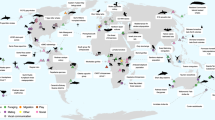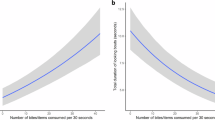Abstract
Why study animal behaviour? In what follows the author argues that this is—or should be—the foundation of a proper understanding and use of the social sciences. The argument is based on two books published recently—“Animal Behaviour” by Robert A. Hinde (McGraw-Hill, 84s.) and “Mechanisms of Animal Behaviour” by Peter Marler and William J. Hamilton (John Wiley, 113s.).
This is a preview of subscription content, access via your institution
Access options
Subscribe to this journal
Receive 51 print issues and online access
$199.00 per year
only $3.90 per issue
Buy this article
- Purchase on SpringerLink
- Instant access to the full article PDF.
USD 39.95
Prices may be subject to local taxes which are calculated during checkout
Similar content being viewed by others
References
Wertheimer, M., Z. Psychol., 61, 6 (1912).
Köhler, W., The Mentality of Apes (London, 1921).
Koffka, K., Principles of Gestalt Psychology (London, 1935).
Spalding, D., “Instinct, with Original Observations on Young Animals,” reprinted Brit. J. Anim. Behav., 2, 2 (1954).
Craig, W., Biol. Bull., 34, 91 (1918).
Jennings, H. S., The Behaviour of the Lower Organisms (New York, 1906).
Lashley, K. S., Psychol. Rev., 45, 445 (1938).
Whitman, C. O., The Behaviour of Pigeons (edit. by Carr, A. H.), 257 (Carnegie Inst., New York, 1919).
Heinroth, O., Verhl. 5 Int. Orn. Kongr., 589 (1910).
Lorenz, K., J. Orn., 80, 50 (1932).
Lorenz, K., J. Orn., 83, 137, 289 (1935).
Lorenz, K., Folia Biotheoretica, 2, 17 (1937).
Hinde, R. A., Phil. Trans. Roy. Soc., 251, 285 (1966).
Hinde, R. A., and Spencer-Booth, Y., Anim. Behav., 15, 169 (1967).
Spencer-Booth, Y., and Hinde, R. A., J. Child Psychol. Psychiat., 7, 179 (1967).
Rights and permissions
About this article
Cite this article
THORPE, W. Zoology and Behavioural Sciences. Nature 216, 17–20 (1967). https://doi.org/10.1038/216017a0
Issue date:
DOI: https://doi.org/10.1038/216017a0



